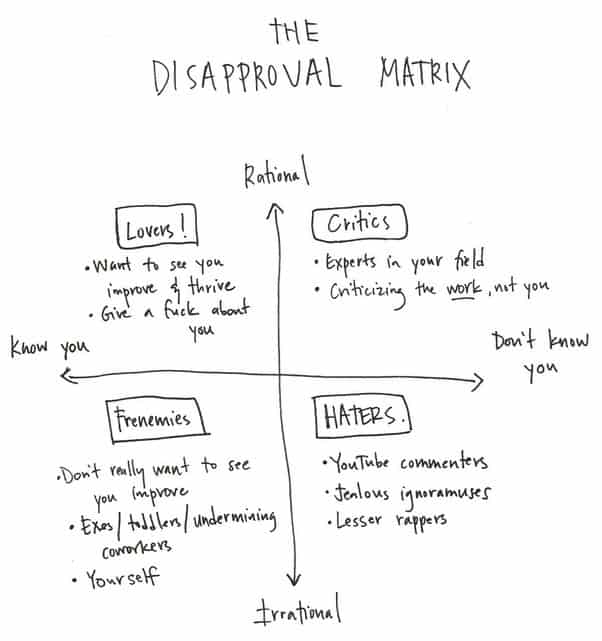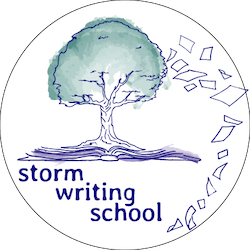Every great writer relies on great readers. Who should you enlist to read your work as it’s in development? In this article, I’ll cover the following (click to navigate to that section).
- Begin with a receptive mindset
- Know that readers vary according to how much and whether they want you to succeed. That’s filter #1
- Diverse readers will be critical
- You may need specialists
- You might want alpha readers
- You’ll definitely want beta readers, volunteer or paid
- I offer some places you can find betas
- You should help betas help you
- And you may want to hire professional readers; there are four kinds
Receiving Criticism
First of all, if you’re going to write a good book, your first step is to write a book that is not as good as it ultimately will be. You’ll spend a lot of time with this book, and as a result, you will not be able to look at it objectively. So you’ll need to rely on other people to tell you how it’s affecting them.
This whole arrangement means that even if you occasionally have people telling you that what you’ve written is wonderful, you’ll also get people telling you where it failed. Because that’s what you’re asking for when you request knowledge on how your art can be better.
Something to keep in mind.
The Disapproval Matrix
Given that you’re going to receive criticism, it’s worth having some perspective on where that criticism might be coming from. I’m in love with Ann Friedman’s Disapproval Matrix, which is “one way to separate haterade from productive feedback.”

Now, you won’t be seeking out Haters for feedback, but if you’re like me, you may occasionally end up in a writing group or a workshop with people that fall into this category, so they may indeed get their grubby hands on your work. Ignore them.
Then there are Frenemies, who know you personally, but whose criticism is really about you, not your work. Friedman adds to this quadrant “The Hater Within, aka the irrational voice inside you that says you suck.” Again, ignore these people.
Lovers and Critics are the ones to listen to. Sometimes, Lovers might be too soft on you. And because you don’t know Critics as well, you may not know whether they’re in some other category, but let their feedback speak for itself. If it’s rational and convincing, listen to it.
(That said, sometimes you have to sit with feedback for a day or three before you realize how valuable it is.)
Jeff VanderMeer in his Wonderbook has some advice about readers, one piece of which echoes Friedman’s perspective above: “You want readers who are good at providing cogent, analytical comments on your work and who don’t get hung up on petty details or are unable to sympathize with what you are trying to do.”
Diversity
VanderMeer also has some very good points about the necessity of diverse readers.
- First of all, you want “true gender and multicultural diversity” because such readers “may expose you to different ideas about fiction and about life that impact elements of your manuscript.”
- Diversity also entails readers who don’t read “the kind of fiction you write.”
- And readers who are not writers. (Which will constitute a significant portion of your ultimate readership most likely.)
- Also: readers of varying levels of experience. It’s absolutely essential to seek out readers with more writing experience at some point.
There is such a thing as a “sensitivity reader,” whom you might enlist if you’ve written a book that includes experiences outside of your culture/ethnicity/race/gender/ability, etc. Such people look for misrepresentations and stereotypes. (Here’s an article about them.)
Specialists
Depending on the kind of story you’re writing, you may want experts in various fields to read through your work. As VanderMeer points out, “Karin Lowachee had her novel Warchild critiqued by a group that included an ex-military man because that book dealt with war and post-traumatic stress disorder.”
If you have scenes involving violence, talk to EMTs or doctors. If your story is set during the Civil War, maybe contact a Civil War re-enactor. If your protagonist is a computer programmer and you’re not, seek out a programmer. And for everything else, get a librarian to read your work. They know ALL.
Alpha Readers
Alpha readers, as the name suggests, are first readers, but they’re also early-stage readers. That is, they might look at your story before it’s been polished enough for others. As such, they’re usually people you’re well acquainted with, who can look past small issues and give a pretty holistic assessment.
You want alphas to look at big-picture stuff. Plenty of time for the line-level thing later on.
Some writers skip alphas altogether. But those who use alphas don’t use many. One or two.
Beta Readers
Beta readers read your next draft. But there’s some variation in how people think about beta readers and at what point they enter the scene.
Some see betas as unpaid volunteers, usually other writers with some level of ability in writing. Some see beta readers more as a focus group—the potential audience for your book, many of whom are not writers. And then developmental editors can also fall under the category of beta readers.
It’s worth noting, however, that the purpose of beta readers is to help you write a book that your ideal readers would consume. As Kristin Kieffer points out, “There’s no use in sending your manuscript to an uninterested reader”; you want to “cultivate a list of betas who most accurately represent your future readers.”
(You might make an exception for developmental editors, who should be able to give you valuable feedback despite perhaps not being your ideal reader. But there’s also something to be said for seeking out experts in your particular genre.)
Beta readers are often not people you know as well. They can be friends or acquaintances, but part of the point is to get some fresh eyes on your manuscript.
How Can You Find Beta Readers?
These days, mostly online. You can certainly search locally for such people—perhaps a writing group at a local library or someone you meet through a class offered in your area—but I’ve found that it’s the rare local group that will read full manuscripts of novels.
You can ask around on social media. Folks on Twitter’s #WritingCommunity will hook you up. And there are lots of Facebook groups where you can find beta readers (10 Minute Novelists, Beta Readers and Critiques, and Indie Author Group to name a few).
Goodreads has a forum for those seeking beta reads.
And there are also some websites dedicated to connecting people with beta readers:
Now, if your ideal reader is a child, then online may not be where you want to go soliciting favors from minors. So if you’re writing children’s lit, in addition to getting some adult writers with experience in children’s lit, I’d push you back toward using local connections and your network of friends and asking parents or teachers to help you organize a way to get your work in front of child readers.
Help Your Betas
The first rule of beta reading, if you’re going to go seeking out volunteer betas, is to offer beta reading yourself. Give to the community if you’re going to take from it.
Regardless of where you find your betas or how you think of them (experts, writer buddies, a focus group), help them focus their feedback. What questions you use will depend a little on your goal, but here are some:
- Where did it bore you and where did it captivate you?
- Were there any things that ripped you from the story? (Plot holes, irrelevancies, inconsistencies)
- Overall, did you like it? Why or why not? (You might even ask for a starred rating on a 1-to-5 scale).
- Did you identify with the characters and/or did you find them engaging?
- How did it make you feel?
- What was it about?
- Would you recommend it to a friend? Why or why not?
You might consider giving them the questions ahead of time and having them focus on the first two questions as they read. And it also might help to have a dialogue. It’s often more respectful of people’s time—especially for writers—to have them talk through their ideas rather than ask them to articulate them all in writing.
Professional Readers
Professional editors usually give you detailed and actionable advice on how to improve your book. Some professional editors have been doing this for a very long time and do it constantly and therefore do it very well.
It’s hard for most volunteer beta readers to compete with critiques and insights offered by a professional.
I want to be clear, though: you can get all the feedback you need for free.
(But you know, you can start a diet and exercise routine without relying on anyone else either.)
So, what kinds of professional readers might you hire?
- Developmental editors look mostly at the extent to which the story is working. You might think of them as professional beta readers. They examine the story’s structure, point out plot holes or inconsistent behavior in your characters, and look at where you might be boring the reader with big info dumps or excessive backstory. They’re basically investigating how well you’re piecing together the puzzle of your story.
- Line editors look at your sentence- and paragraph-level craft. They’ll edit for clarity, eliminate needless repetition, examine the rhythm of your prose, read for consistency in voice and tone, interrogate your word choice, and make sure you’re not abusing dialogue tags or resorting to cliched behavior or gestures for your characters.
- Copy editors go in a little closer than line editors. They look at grammar and usage—style manual stuff. They’ll make sure your capitalization and punctuation is correct.
- Proofreaders do a final pass to eliminate errors and typos. Proofreading as a term has come to mean scanning for errors, but in publication, proofreading refers to looking over the galley proof of a book prior to its being printed for wider consumption.
Keep in mind that there’s some overlap between each of the above. A proofreader looks for a lot of the same things a copy editor would look for; it’s just that the proofreader’s timing is later in the process.
Each level of editing bleeds into the next. When I do developmental edits, I often do a little line and copy editing, too.
Some professionals can do what they might call a comprehensive edit, in which they’re intentionally looking at developmental, line, and copy editing. It’s often not worth doing much copy editing until the big developmental ones are figured out, but a comprehensive edit can be great for learning purposes: it will help you discover trends in your micro-level craft that may be affecting your storytelling writ large.
The bottom line: it takes a small village to write a book. Seek out readers, cultivate your relationships with the good ones, and appreciate them.

Further Reading
- Dealing with Rejections and Criticism
- Approaching the Workshop
- Should You Hire a Professional Editor?
- 4 Levels of Editing Explained
- How to Find and Work with Beta Readers
- The Complete Guide to Beta Readers
- Five Questions to Ask a Beta Reader When They Critique Your Manuscript
- Finding Your Best Beta
- Beta Readers: Who, When, Why, and So What?
This article is part of the Author Toolbox Blog Hop. To continue hopping through other great blogs in the monthly hop or to join, click here and/or search #AuthorToolboxBlogHop on Twitter and Pinterest (here’s the group board).





12 Responses
Great tips! I have two Alpha readers and I’ve found my best betas just by requesting them on my blog. They don’t know me so they don’t seem worried about hurting my feelings but they don’t seem to be haters (maybe I’ve just gotten lucky there)
That’s a great approach–people you don’t know but who are likely not there to tear you down.
It does indeed take a village. I’m going to think about it that way now. I’ve also found it important to seek out readers of different ages, and for the book I’m currently revising, I’d like to find at least one reader who is differently abled.
Good idea. Is that because you have a differently-abled character or because you want their viewpoint on the non-differently-abled characters?
Good resources and ideas. Which of the websites listed have you used to find beta readers?
Most of my betas have come from connections I’ve made through grad school or through writing conferences, actually. I suppose I should have mentioned that writing conferences are a great place to meet potential betas, especially given that I was just at a writing conference last weekend. 🙂
I have four people who have offered to be beta readers (including a published author), but none of them really read my genre, so I’m thinking they’ll really be alpha readers. Also, all women, and I’d like a little diversity in the feedback. I think writer’s conferences would be a good resource for the beta readers, as you point out.
Great article. It is so important to find the right readers for your book. Thanks for sharing!
Brilliant post!
I’ve found many authors can’t distinguish between a critic and a hater, especially when it comes to reviews. Someone is not automatically a hater just because they didn’t like your book. Your diagram is helpful for pointing out the difference.
Another excellent point is that if you’re seeking honest feedback, then people will tell you where you’ve failed. If no one is giving you the bad news, you haven’t asked enough people (or you haven’t asked the right people).
Yes! Great points, Iola. If you’re getting no bad news, you need to find some other readers.
Thanks for defining all the different types of editors plus explaining the difference between alpha and beta readers. This topic has been on my mind recently as I joined a great supportive facebook group for women writers where people have been looking for beta readers. This article fills in the gaps in my knowledge nicely and your list of websites is also very helpful. Thanks Tim!
My pleasure, Helen. I’m glad you found it useful!